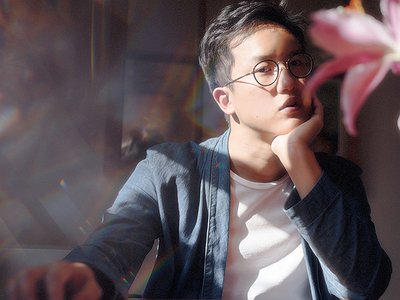Part 2
Could you describe your creative process on the basis of a piece or album that's particularly dear to you, please? Where did the ideas come from, how were they transformed in your mind, what did you start with and how do you refine these beginnings into the finished work of art?
I have a song called “舞狮” (Lion Dance) that was inspired by the lilting rhythms of a drummer in a Chinese New Year Lion Dance video I found on YouTube. His playing had a bizarre lilt in it that’s driving yet fluid, so I based the rhythmic backbone of this song on that. The instrumentation was also inspired by Lion Dance music, which usually consists of a percussion ensemble called 锣鼓 playing drums and gongs. I felt a sonic kinship between this and Swarm (a different track on the album consisting of a very free improvisation on a complex virtual instrument built from tuned open snare drum samples that I made), so I ended up sampling short bursts from Swarm to bring this one to life. There are also pads that were made out of bowed cymbal samples and an arp instrument that I made from bamboo flutes. After creating these virtual instruments, I tracked myself doing improvisations on them and started to piece together sections until a form emerged. From that point on, it’s a long process of finessing and polishing.
There are many descriptions of the ideal state of mind for being creative. What is it like for you? What supports this ideal state of mind and what are distractions? Are there strategies to enter into this state more easily?
For me, creative momentum is completely dependent on inspiration. As much as I love working at home in my peaceful studio with all my gear available, environment isn’t super important to me. I’ve learned to be able to be creative even while on the road. I love working on flights for example (less distractions!). The major distraction is my phone- emails/ social media/ messages. I’ve started to put it on silent when I’m working and that’s been helpful.
How is playing live and writing music in the studio connected? What do you achieve and draw from each experience personally? How do you see the relationship between improvisation and composition in this regard?
Improvisation is a form of composition. It’s just bound by the limitation of composing from an intuitive place. I like to draw deeply both from improvisation as well as more contemplative composing when making music. Pursuing either approach purely can get stale, and I like that they can shock each other’s systems.
How do you see the relationship between the 'sound' aspects of music and the 'composition' aspects? How do you work with sound and timbre to meet certain production ideas and in which way can certain sounds already take on compositional qualities?
Since I grew up learning about the language of music in terms of harmony, melody and rhythm, ‘sound’ or as I like to call it, ‘sonics’ has been the exciting new frontier for me. Lately I’ve been getting the sense that all these elements that used to feel very separate in my head, are all really different sides of the same thing. More and more, I find myself thinking about the melody of a drum beat, or the rhythm of a melody… every element is always present in any auditory experience.
Our sense of hearing shares intriguing connections to other senses.
From your experience, what are some of the most inspiring overlaps between different senses - and what do they tell us about the way our senses work? What happens to sound at its outermost borders?
I love sensory stimulation of all kinds! I think there’s a lot to be learned from the sense of taste and smell when it comes to balance of flavors because it’s such an inward experience. Hearing and sight have inspiring overlap when it comes to spatial perception. When working on a mix, I’m often thinking about which elements should feel close-up and which elements should feel far. It’s not unlike how the composition of a photograph or a shot in a movie is constructed. Things get really interesting in both mediums when spatial perception gets warped too!
Art can be a purpose in its own right, but it can also directly feed back into everyday life, take on a social and political role and lead to more engagement. Can you describe your approach to art and being an artist?
For me, the way my art relates to my values and the way I perceive the world is relatively subliminal, but I do think that I would like to explore being more intentional with how my work can enrich the communities that matter to me and address the issues that I think are important.
It is remarkable, in a way, that we have arrived in the 21st century with the basic concept of music still intact.Do you have a vision of music, an idea of what music could be beyond its current form?
The one sense I didn’t mention earlier is touch, and I think there’s a lot more to be explored in this realm in how it relates to music. I think we’re only scratching the surface of the power of immersive experiences, and I think we’re still wrapping our heads around how to make artistically powerful statements with them. I deeply believe that the act of playing or experiencing music creates empathy between people, and I think that immersive experiences can go even deeper than we have before.





